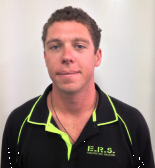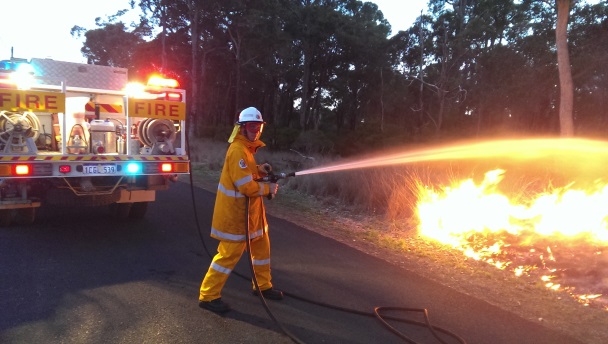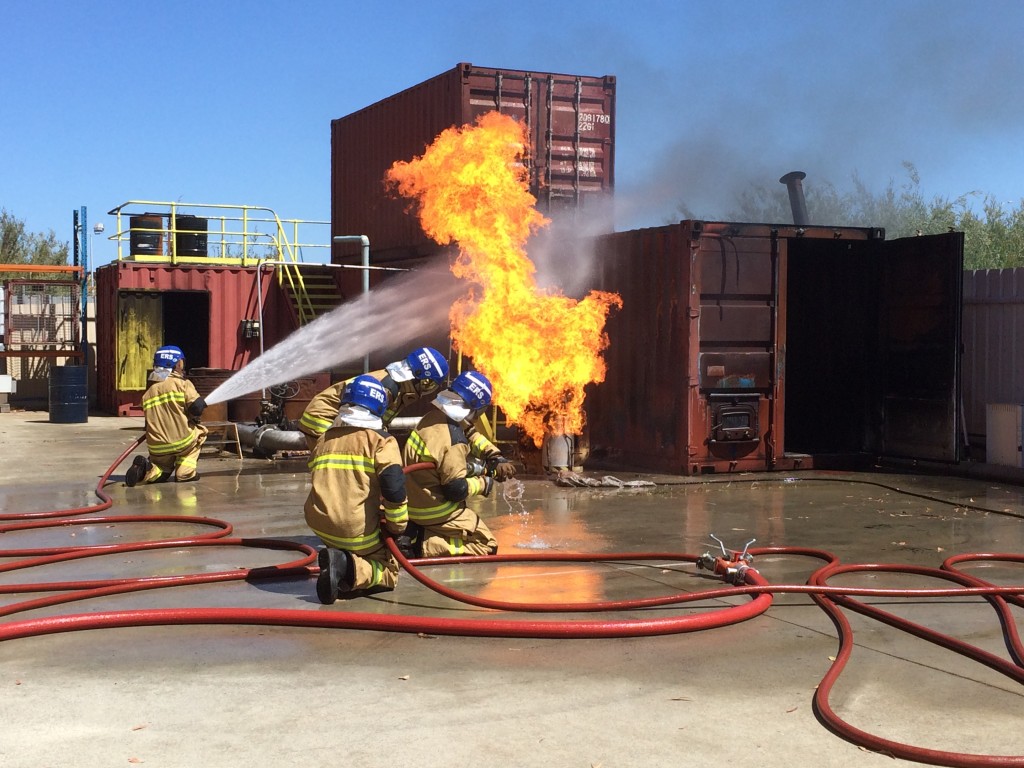At ERS we are very fortunate to have a number of volunteer firefighters in our team. It is such a fulfilling role and a lot of us do not understand the sacrifices volunteers make to contribute to their community. We have asked a few of them to tell us about their volunteer firefighter life, challenges and biggest achievements.This week Angus Hamilton shares his story with us.
 Originally a farm kid from New Zealand, I moved to Australia in 2006 and became a bar manager. I have worked several jobs before becoming a security guard on a mine site where I joined their ERT team as a volunteer and enjoyed it so much I worked my way up to becoming an Emergency Services Officer (ESO). I have now been an ESO with ERS since 2012. I had the amazing opportunity to start with them when they won one of the biggest contracts in Emergency Response in WA on the Roy Hill project. I mobilised on the very first day the company started at Rail Camp 1 on the 2nd August 2012 and participated in the initial set up.
Originally a farm kid from New Zealand, I moved to Australia in 2006 and became a bar manager. I have worked several jobs before becoming a security guard on a mine site where I joined their ERT team as a volunteer and enjoyed it so much I worked my way up to becoming an Emergency Services Officer (ESO). I have now been an ESO with ERS since 2012. I had the amazing opportunity to start with them when they won one of the biggest contracts in Emergency Response in WA on the Roy Hill project. I mobilised on the very first day the company started at Rail Camp 1 on the 2nd August 2012 and participated in the initial set up.
Outside of my work with ERS, I am also a Volunteer with the Witchcliffe Brigade (5 minutes South of Margaret River). Up until 3 years ago we were just a bush fire brigade that was run by the local shire. But after the huge scare from the Margaret River bushfires and with the town developing so fast we have been incorporated into the Department of Emergency Services (DFES) and are now a dual brigade Volunteer Fire Service (VFS) and Bush Fire Brigade (BFB).
VFS responds to ur ban calls such as house fires and alarm call outs; but also backs up the Margaret River brigade on more significant jobs when 2 pumps are required. The BFB generally responds to everything else related to fighting bush / wildfire. We have about 16 members like myself that are dually registered (VFS and BFB) and around 60 members just in the BFB alone.
ban calls such as house fires and alarm call outs; but also backs up the Margaret River brigade on more significant jobs when 2 pumps are required. The BFB generally responds to everything else related to fighting bush / wildfire. We have about 16 members like myself that are dually registered (VFS and BFB) and around 60 members just in the BFB alone.
Training is 2 hours every second Friday for each division so the dual members end up training every week. On top of that there are the call outs. Over winter we get about 1 call out a week. However in the summer months and school holidays we can sometimes get called out every second day. Sometimes depending on the size of the fire it may take several days to put it out so we have to work shifts. We also send crews out to other shires to assist with major bushfires, such as the recent ones in Northcliffe.
I find my motivation from being able to give back to the community and help people. Working with a good crew who has the same passion and motivation helps as well.
The most challenging thing is trying to fit into a course on my R&R. Sometimes it means driving to another shire and staying a couple of days to complete a course. I quite often end up going to Collie or Waroona for training.
My most recent success story  would be at 14h45 on 25th January 2015 when the 1st southerly wind in 3 months uncovered some smouldering embers from a bonfire pile (supposedly out 2 months beforehand), causing a bush fire emergency. Flames raced across a local farmers paddock threatening 3 houses and large piles of stock feed as it burned into the edge of the national park. Thanks to a quick response the fire was prevented from jumping the 2 main roads and getting into the thick bush on the coast which would have been a catastrophe. Our intervention resulted in the fire being contained across 3 farming properties, burning a total of 48 hectares.
would be at 14h45 on 25th January 2015 when the 1st southerly wind in 3 months uncovered some smouldering embers from a bonfire pile (supposedly out 2 months beforehand), causing a bush fire emergency. Flames raced across a local farmers paddock threatening 3 houses and large piles of stock feed as it burned into the edge of the national park. Thanks to a quick response the fire was prevented from jumping the 2 main roads and getting into the thick bush on the coast which would have been a catastrophe. Our intervention resulted in the fire being contained across 3 farming properties, burning a total of 48 hectares.
During the Peak of the fire there were 32 appliances and 90 firefighters from 6 local Brigades as well as 2 Water bombing helicopters and 2 fixed wing aircraft. Witchcliffe brigade put in 450 hours across a 48 hour period between 30 members that attended. Thanks to the help from all the other attending crews a good outcome was achieved with only minimal loss to properties.
What I wish people knew is that volunteer brigades are just that, VOLUNTEERS. We give up our own personal time and money to attend. What people also don’tknow is that you don’t have to be a firefighter to become a volunteer in a brigade. We always need support crews when we attend major fires, such as people to record radio transmissions, to organise food, to liaise with incoming brigades etc. If you have ever wanted to give back to your community then please get in touch with your local brigade.
Working away makes it ha rd to make all the training sessions so the constant skills maintenance and training that I do with ERS on site helps to keep me up to a high standard that makes me a valuable member of the brigade.
rd to make all the training sessions so the constant skills maintenance and training that I do with ERS on site helps to keep me up to a high standard that makes me a valuable member of the brigade.
Learning from other ERS members with different backgrounds helps to give me a broad range of skills and techniques which I have found myself teaching other brigade members benefiting the team.
Angus Hamilton, ERS Emergency Services Officer

